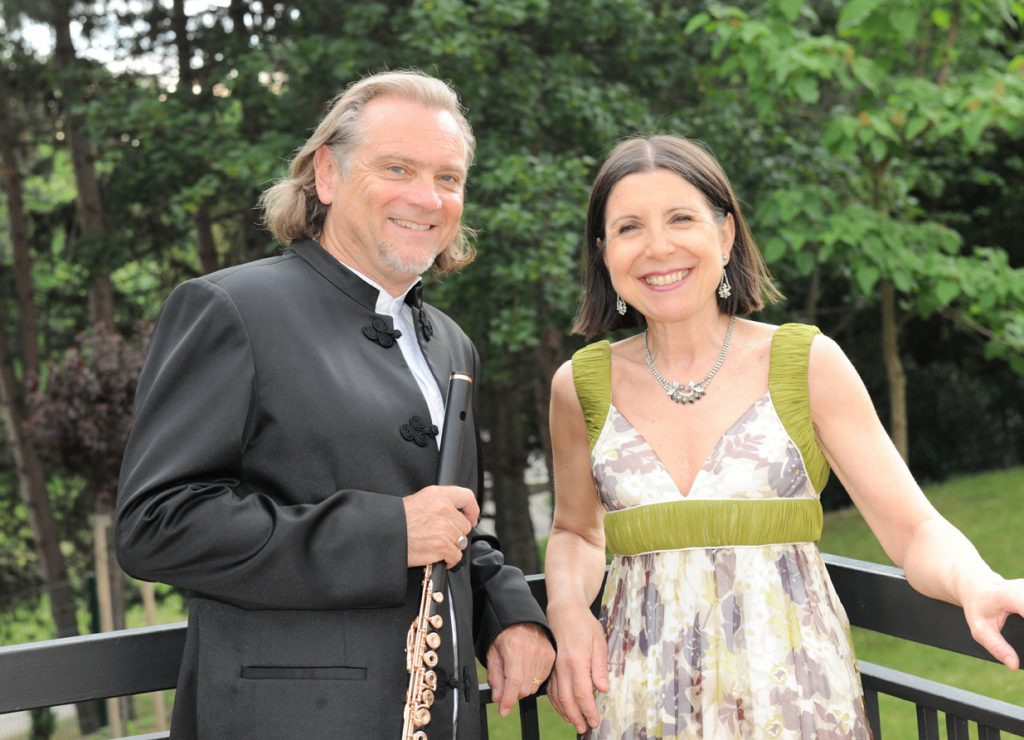ROMANCE: GERMAN AND FRENCH ROMANTIC MUSIC FOR FLUTE AND PIANO
PATRICK GALLOIS, FLUTE; MARIA PRINZ, PIANO
WEILL RECITAL HALL AT CARNEGIE HALL, NEW YORK, NY
MARCH 6, 2014

Patrick Gallois, flutist and Maria Prinz, pianist
MidAmerica Productions is one of the busiest concert presenters in New York, indeed worldwide. In my experience, their concerts are always on a high level and their audiences substantial. Weill Hall was almost full for this recital, no small accomplishment for an instrumental recital in which the performers are not household names. The concert focused on that most beloved musical era, the Romantic period. The first half was focused on German music and the second half, French. The stated goal, according to the program notes, was to “bring listeners to explore another atmosphere in another world.”
First we heard Three Romances, Op. 94, by Robert Schumann. Originally written for oboe, Mr. Gallois, needed to change only a few notes to make them work for the flute. These pieces were presented by Robert to his wife Clara in 1849 as a Christmas present. These lovely “songs without words” no doubt made a hit with their recipient. As we are reminded in the distinctly romantic program notes written by Ms. Prinz, Robert and Clara Schumann’s relationship was ”one of the most famous love stories in music history.” These exquisite, tuneful pieces remind one of Robert Schumannʼs Lieder and could probably be successfully performed on any treble instrument. The second, in the major mode, is especially beautiful. All three were given a sensitive and shapely performance.
The remainder of the first half was devoted to Carl Reineckeʼs Undine Sonata, Op. 167. In addition to being unquestionably “romantic” in style, this piece is distinctly programmatic. Undine was a water spirit who fell in love with a human, was betrayed by him, gave him a fatal kiss and then returned to the water. In the first movement the waves and undulations of the water were clearly depicted in the flute line, played with limpid fluidity by Mr. Gallois, and by the arpeggiated chords in the piano, sensitively executed by Ms. Prinz. The sparkling second movement begins with rapid staccato notes in the flute (Undine is getting excited!) followed by dotted rhythm of the piano (the knight has arrived!) The third movement is a beautiful love duet, played with great feeling by Mr. Gallois and Ms. Prinz. Then, in the fourth movement, the Sturm und Drang of betrayal and retribution are portrayed in rapid scale passages and diminished seventh chords. At the end of the piece we return to the rocking 6/8 meter of the first movement as, like a good Rhine maiden, Undine returns to her original home.
After intermission we heard a lovely Romance, Op. 37, by Camille Saint-Saëns. The flute’s tender melody was played beautifully, and its rapid scales and octave passages were tossed off with aplomb. Next we heard Charles-Marie Widorʼs Suite, Op. 34. The beautiful third movement, entitled Romance, was captivating, and the technical challenges of the finale were deftly managed by both performers. Its second movement is evidently a most effective Scherzo, as it elicited delighted chuckles from the audience.
The last piece on the program was Gabriel Piernéʼs Sonata, Op. 36. Originally this piece was written for violin, however it is often performed on the flute. Indeed, the original sheet music mentions that it can be played by either instrument. During this work, the flute was sometimes overbalanced by the piano, especially towards the end. Perhaps this problem would have been alleviated if the lid of the piano had been moved to the short stick. The lid was fully open for the entire program, but there were no balance problems in previous works.
The audience was obviously enchanted with everything Mr. Gallois and Ms. Prinz did and rewarded them with fulsome applause. The encore was Maurice Ravelʼs “Kaddisch,” from the composer’s Deux Mélodies hébraïques. Originally written for voice and piano, the voice part was transcribed for flute by Mr. Gallois.
Written by Barrett Cobb for New York Concert Review.

0 Comments